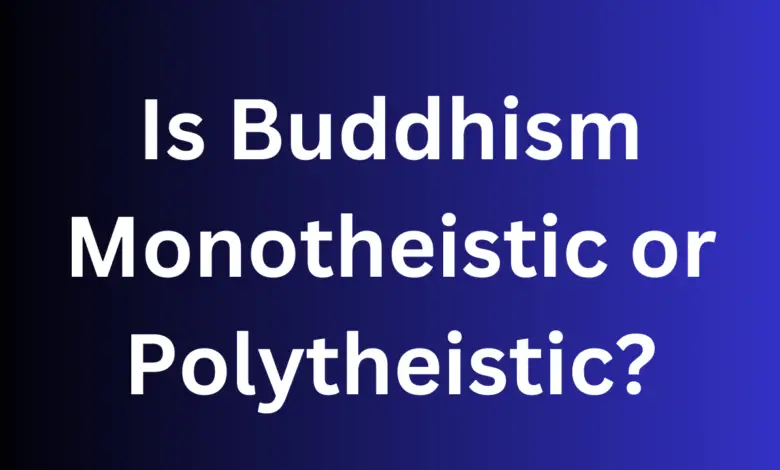Is Buddhism Monotheistic or Polytheistic?

Is Buddhism Monotheistic or Polytheistic?
Buddhism is a fascinating and diverse religious tradition with deep roots in Asia. As we delve into its theological aspects, a common question arises: Is Buddhism monotheistic or polytheistic? The answer, however, is not as straightforward as one might expect.
- Why Do Muslims Hate Jews?
- Islamic Civilization | “Exploring the Rich Tapestry | 2023
- Surah Nasr | 110th Chapter | The Divine Assistance | 2023
Understanding the Basics
To begin, let’s clarify what monotheism and polytheism mean. Monotheism is the belief in a single, all-powerful God, while polytheism involves the worship of multiple deities. Many of the world’s religions can be neatly categorized into one of these two camps, but Buddhism challenges such categorization.
The Core of Buddhism
At the heart of Buddhism is the teaching of Siddhartha Gautama, also known as the Buddha. He lived in India around 2,500 years ago and founded this spiritual path. The Buddha’s teachings primarily revolve around the Four Noble Truths and the Eightfold Path, which provide a framework for understanding suffering and the path to enlightenment.
The Dharma and Non-Theism
Buddhism’s core concept, the Dharma, is not a god or gods but rather the cosmic law and order that govern the universe. The Dharma is a fundamental aspect of Buddhist philosophy, and it emphasizes the importance of ethics, mindfulness, and meditation in one’s spiritual journey.
The Role of Deities in Buddhism
Now, here’s where things get interesting. While Buddhism is often portrayed as non-theistic due to its focus on the Dharma, it’s not entirely devoid of deities. Some Buddhist traditions incorporate various deities, spirits, and celestial beings into their belief systems. These beings, however, are not regarded as all-powerful creators like the God in monotheistic religions.
Polytheistic Elements in Buddhism
In certain Buddhist traditions, especially in East Asian countries like Japan and Tibet, there are beliefs in a pantheon of deities. For instance, Tibetan Buddhism incorporates a complex system of deities and spirits, and Japanese Buddhism reveres a variety of Bodhisattvas and local deities.
Veneration vs. Worship
It’s important to distinguish between veneration and worship. In Buddhist practices, adherents may venerate deities or Bodhisattvas, showing respect and seeking their guidance. This is different from the worship of an all-powerful god in monotheistic religions.
Pure Land Buddhism
Pure Land Buddhism is another significant branch that highlights the veneration of the Amitabha Buddha, who presides over a heavenly realm called the Pure Land. Followers aspire to be reborn in this Pure Land, where they can continue their spiritual journey.
Monotheistic Interpretations
On the other hand, there are interpretations of Buddhism that align more closely with monotheism. Some modern Buddhists, especially in the West, emphasize a more secular and non-theistic approach, focusing on the Buddha’s teachings while setting aside deities and supernatural elements.
A Middle Path
In essence, Buddhism doesn’t fit neatly into either the monotheistic or polytheistic category. It’s a rich tapestry of beliefs and practices, and the question of whether it’s monotheistic or polytheistic depends largely on the specific tradition and interpretation.
Conclusion
In the end, whether Buddhism is monotheistic or polytheistic is a matter of perspective. The diversity of beliefs within Buddhism is a testament to its adaptability and the variety of ways in which people can find meaning and purpose on their spiritual journeys. It’s a reminder that sometimes, the most profound questions about religion don’t have straightforward answers, and that’s perfectly okay in the complex world of spirituality.
FAQs-Is Buddhism Monotheistic or Polytheistic?
What is the basic belief of Buddhism?
Buddhism revolves around the Four Noble Truths and the Eightfold Path, which guide individuals towards enlightenment and the cessation of suffering.
Does Buddhism have a central god?
No, Buddhism does not have a central, all-powerful god. It is typically considered a non-theistic or polytheistic religion.
Who is Siddhartha Gautama, and what is his significance in Buddhism?
Siddhartha Gautama, known as the Buddha, is the founder of Buddhism and revered as the enlightened one who attained Nirvana.
What are Bodhisattvas in Buddhism?
Bodhisattvas are enlightened beings who choose to remain in the cycle of rebirth to help all living creatures achieve enlightenment.
How do Buddhists meditate, and why is meditation important?
Buddhists practice various forms of meditation, such as mindfulness meditation, to cultivate inner peace, self-awareness, and insight.





